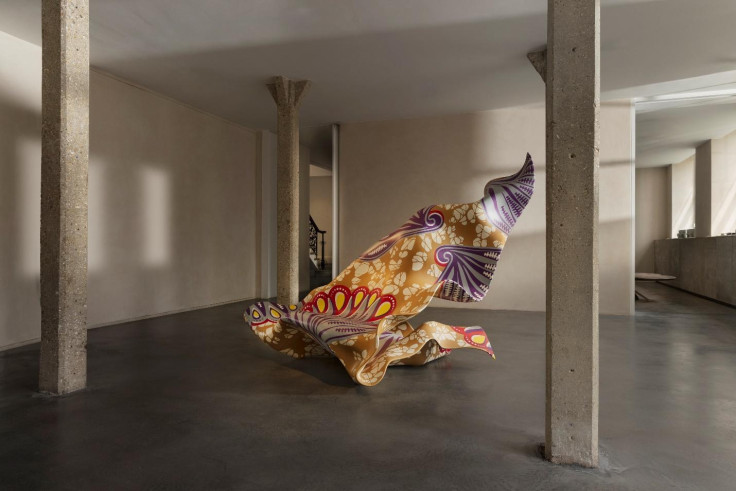Carpenter Workshop Gallery's Yinka Shonibare: A Visionary Artist Exploring Identity And Culture
Yinka Shonibare is known for his unique artistic exploration of post-colonialism and the effects of globalisation worldwide

Yinka Shonibare (CBE) is an influential British/Nigerian contemporary artist whose work delves into complex themes of racial, class, and national identity. Born in London in 1962 and raised in Lagos, Nigeria, Shonibare's bicultural background has profoundly influenced his art and outlook on life.
He is primarily known for his unique artistic exploration of post-colonialism and the effects of globalisation on communities worldwide. His diverse work spans painting, sculpture, photography, film, and installations, characterised by his signature use of brightly coloured Ankara fabric and Dutch wax.
Early Life And Education
A stark cultural duality marked Yinka Shonibare's early life, splitting his formative years between the U.K., where his mother grew up, and Nigeria, where his father Olatunji lived. Shonibare's sense of cultural "otherness" was heightened by a late childhood experience of contracting transverse myelitis, an inflammation of the spinal cord that left him partially paralyzed. Despite this, he recovered enough to continue his artistic studies.
Shonibare studied Fine Art at Byam Shaw School of Art (now Central Saint Martins) and later at Goldsmiths College, University of London, where he received his MFA. These prestigious institutions equipped him with a solid grounding in both traditional European and African art and a lifelong love for contemporary practices. The fusion of these influences has been a significant theme of his career.
Artistic Themes And Influences
Yinka Shonibare's early work is deeply influenced by Western art history and literature, which he reinterprets to critique contemporary societal norms. He addresses issues of race and class using various media, often juxtaposing historical European contexts with African cultural elements. One of the most distinctive aspects of Shonibare's work is his use of Dutch wax fabric, which he buys from Brixton Market in London. Initially produced in Europe for the Indonesian market, Dutch wax fabric was later adopted by West African communities and has since become symbolic of African identity. Through this material, Shonibare addresses themes of colonialism, global trade, and cultural appropriation.
Notable Works: Wind Sculptures And Windy Chair
Yinka Shonibare's most notable works include his Wind Sculptures series, which aims to capture wind movement through fibreglass and bronze. These sculptures challenge traditional notions by depicting the ephemeral, dynamic forms of thin air in solid materials. The Wind Sculptures are often seen as public installations around London, encouraging viewers to think about the invisible forces that shape their environment and perceptions.
Similarly, Shonibare's Windy Chair, showcased at the Carpenters Workshop Gallery in London, represents another iteration of this concept. Each piece in this limited-edition series is unique in its Dutch-wax-inspired patterns. The Windy Chair series transforms everyday objects into profound artistic statements, creating the illusion of dynamic movement despite being crafted from weighty materials like aluminium and steel.
The colourful and playful patterns reflect an innovative approach to contemporary design and fabrication, achieving remarkable energy and balance in a gravity-defying form.
Collaborations And Exhibitions
Yinka Shonibare has engaged in high-profile collaborations with prominent figures in the art world, blending traditional artisanal techniques with contemporary practices. He has worked with esteemed institutions like the Royal Opera House, which commissioned his Globe Head Ballerina in 2012, and the David Oluwale Memorial Association, for which he unveiled a new outdoor sculpture in Aire Park, Leeds, as part of Leeds 2023. Shonibare's work was also featured in the Nigerian Pavilion at the Venice Biennale 2024, highlighting his significant influence on contemporary African art.
Shonibare's collaboration with Carpenters Workshop Gallery has also led to the creation of unique and innovative artworks, such as his Windy Chair series, which were showcased in the gallery's exhibitions.
The artist's contributions to contemporary art have been widely recognized. In 2019, he was awarded the decoration of Commander of the Order of the British Empire (CBE) for distinguished services to art. His art has been exhibited in leading museums and galleries worldwide, including the Tate Modern in London, the Museum of Modern Art in New York, and the National Museum of African Art in Washington, D.C. Numerous public and private collections include his work, affirming his status as a world-class artist.
Legacy
One of the most prolific artists of his generation, Yinka Shonibare explores issues of race and class through various media. His work comments on the relationship between Africa and Europe and the formation of cultural identities within a globalised world. Notable works include "Gallantry and Criminal Conversation," commissioned by Okwui Enwezor at Documenta in 2002, and "Nelson's Ship in a Bottle," displayed in London's Trafalgar Square and now permanently outside the National Maritime Museum.
Shonibare has exhibited globally at institutions including the Frederick Meijer Gardens and Sculpture Park in Michigan, the British Museum in London, and the Serpentine in London. In 2024, the Serpentine presented a solo exhibition of his works.
© Copyright IBTimes 2025. All rights reserved.





















